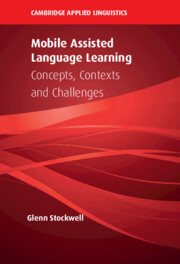Book contents
- Mobile Assisted Language Learning
- The Cambridge Applied Linguistics Series
- Mobile Assisted Language Learning
- Copyright page
- Dedication
- Contents
- Figures
- Tables
- Acknowledgements
- Abbreviations
- 1 Introduction
- 2 Fundamental Considerations of Teaching with Mobile Technologies
- 3 Shifting Paradigms in Language Learning and Teaching
- 4 Research Considerations in MALL
- 5 Theory in MALL
- 6 Physical, Psychosocial and Pedagogical Issues
- 7 The Learner in MALL
- 8 Designing MALL Environments
- 9 Concepts, Contexts and Challenges in MALL
- Glossary
- References
- Index
7 - The Learner in MALL
Published online by Cambridge University Press: 23 December 2021
- Mobile Assisted Language Learning
- The Cambridge Applied Linguistics Series
- Mobile Assisted Language Learning
- Copyright page
- Dedication
- Contents
- Figures
- Tables
- Acknowledgements
- Abbreviations
- 1 Introduction
- 2 Fundamental Considerations of Teaching with Mobile Technologies
- 3 Shifting Paradigms in Language Learning and Teaching
- 4 Research Considerations in MALL
- 5 Theory in MALL
- 6 Physical, Psychosocial and Pedagogical Issues
- 7 The Learner in MALL
- 8 Designing MALL Environments
- 9 Concepts, Contexts and Challenges in MALL
- Glossary
- References
- Index
Summary
The main focus of this chapter is the ultimate user of MALL, the learner. The chapter begins with exploring learner agency to help us to gain a better understanding of how and why learners are or are not able to make appropriate choices applicable to their learning. Agency may be related to individual characteristics of the learner, but it may also be supported by proxy or collective agency from the teacher or larger environment. Even learners who exhibit agency experience difficulties in making appropriate choices about their learning, which is why learner training is essential. In MALL, learner training is key in ensuring that learners understand the reasons for engaging in mobile activities as well as what is expected of them from teachers. The chapter describes evidence that ongoing training in technological, strategic and pedagogical aspects can have a very powerful effect on the ways in which learners view mobile learning activities.
- Type
- Chapter
- Information
- Mobile Assisted Language LearningConcepts, Contexts and Challenges, pp. 130 - 147Publisher: Cambridge University PressPrint publication year: 2022

